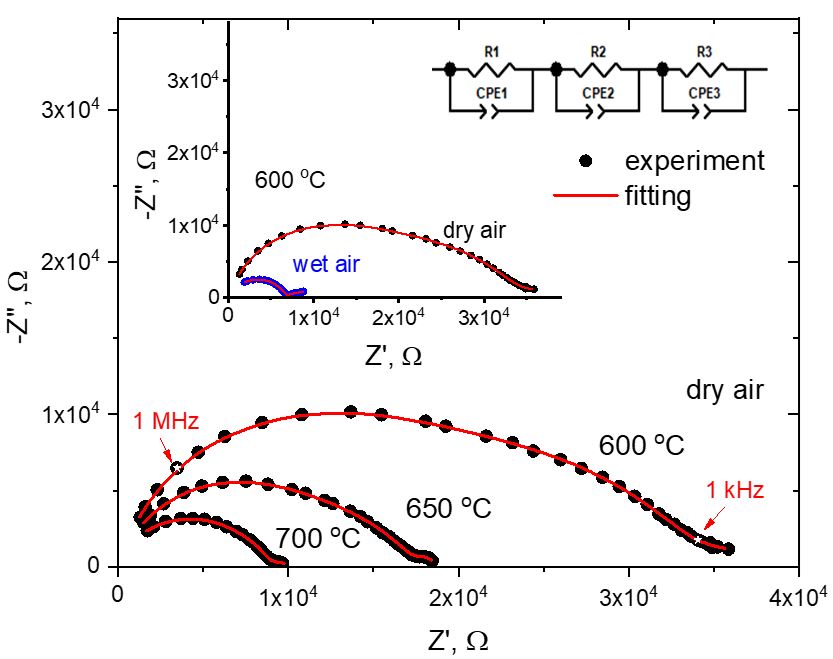
Oxygen-ion and proton conductivity in the Ba3InGa2O7.5 complex oxide with incomplete oxygen sublattice
Abstract
Keywords
Full Text:
PDFReferences
Zhang W, Hu YH. Progress in proton-conducting oxides as electrolytes for low-temperature solid oxide fuel cells: From materials to devices. Energy Sci Eng. 2021;9:984–1011. doi:10.1002/ese3
Nayak AP, Sasmal A. Recent advance on fundamental proper-ties and synthesis of barium zirconate for proton conducting ceramic fuel cell. J Cleaner Product. 2023;386:135827. doi:10.1016/j.jclepro.2022.135827
Guo R, He T. High-entropy perovskite electrolyte for protonic ceramic fuel cells operating below 600 °C. ACS Mater Lett. 2022;4:1646–1652. doi:10.1021/acsmaterialslett.2c00542
Animitsa IE. High-temperature proton conductors with structural-disordered oxygen sublattice. Russ J Elecrtochem. 2009;45(6):668–676. doi:10.1134/S1023193509060081
Wang Zh, Jiao H, Fu Z. Investigation on the up-conversion luminescence and temperature sensing properties based on non-thermally coupled levels of rare earth ions doped Ba2In2O5 phosphor. J Luminescence. 2019;206:273–277. doi:10.1016/j.jlumin.2018.10.034
Yoon S, Son K, Hagemann H. Cr-substitution in Ba2In2O5·(H2O)x (x = 0.16, 0.74). Solid State Sci. 2017;73:1–6. doi:10.1016/j.solidstatesciences.2017.08.019
Wang L, Gu Yu, Dai H, Yin Y, Lei L. Sr and Fe co-doped Ba2In2O5 as a new proton-conductor-derived cathode for proton-conducting solid oxide fuel cells. J Eur Ceram Soc. 2023;43(10):4573–4579. doi:10.1016/j.jeurceramsoc.2023.03.035
Thundiyil Sh, Kurungot S, Devi N. Synergistic effect of B site co-doping with Co and Ce in bifunctional oxygen electrocatalysis by oxygen deficient brownmillerite Ba2In2O5. Catalysis Today. 2021;375(1):494–500. doi:10.1016/j.cattod.2020.05.046
Tyagi D, Shirsat AN, Saha B, Varma S. Phase stabilisation, chemical behaviour and protonic conductivity of vanadium doped Barium Indate for ITSOFC application. J Alloys Compd. 2021;877:1–7. doi:10.1016/j.jallcom.2021.160298
Abakumov AM, Shpanchenko RV, Lebedev OI. The phase transitions and crystal structures of Ba3RM2O7.5 complex oxides (R = rare-earth elements, M = Al, Ga). Acta Crystallographica. 1999;55:828–839. doi:10.1107/S0108767399002068
Fuller A, Murrell J, Blom D. Oxide ion conductivity, proton conductivity, and phase transitions in perovskite-derived Ba3xSrxYGa2O7.5 0 ≤ x ≤ 3 materials. J Mater Chem. 2022;34(4):3185–3196. doi:10.1021/acs.chemmater.1c04372
Fuller A, Blom D, Vogt Th. Oxide ion and proton conductivity in a family of highly oxygen deficient perovskite derivatives. J Am Chem Soc. 2022;144(4):615–624. doi:10.1021/jacs.1c11966
Saito K, Fujii K, Yashima M. Oxide-ion and proton conductivity of the ordered perovskite BaY1/3Ga2/3O2.5. J Solid State Chem. 2022;306:122733. doi:10.1016/j.jssc.2021.122733
Yao T, Uchimoto Y, Kinuhata M, Inagaki T, Yoshida H. Crystal structure of Ga-doped Ba2In2O5 and its oxide ion conductivity. Solid State Ionics. 2000;132(3–4):189–198. doi:10.1016/S0167-2738(00)00658-5
Yoshinaga M, Yamaguchi M, Furuya T, Wang S, Hashimoto T. The electrical conductivity and structural phase transitions of cation-substituted Ba2In2O5. Solid State Ionics. 2006;169:9–3. doi:10.1016/j.ssi.2003.10.019
Didier Ch, Claridge J, Rosseinsky M. Crystal structure of brownmillerite Ba2InGaO5. J Solid State Chem. 2014;218:38–43. doi:10.1016/j.jssc.2014.06.011
Fisher C, Islam M. Defect, protons and conductivity in brownmillerite-structured Ba2In2O5. Solid State Ion. 1999;118:355–363. doi:10.1016/S0167-2738(98)00391-9
Kreuer K-D, Fuch A, Maier J. H/D. Isotope effect of proton conductivity and proton conduction mechanism in oxides. Solid State Ion. 1995;77:157–162. doi:10.1016/0167-2738(94)00265-T
Hideshima N, Hashizume K. Effect of partial substitution of In by Zr, Ti and Hf on protonic conductivity of BaInO2.5. Solid State Ionics. 2010;181:1659–1664. doi:10.1016/j.ssi.2010.09.029
Quarez E, Noirault S, Caldes T. Water incorporation and proton conductivity in titanium substituted barium indate. J Power Sourses. 2010;195:1136–1141. doi:10.1016/j.jpowsour.2009.08.086
Zio´ŀkowski J. New relation between ionic radii, bond length, and bond strength. J Solid State Chem. 1985;57(3):269–290. doi:10.1016/0022-4596(85)90152-5
Andreev RD, Animitsa IE. Transport properties of intergrowth structures Ba5In2Al2ZrO13 and Ba7In6Al2O19. Appl Sci. 2023;13(6):3978. doi:10.3390/app13063978
Tarasova NA, Animitsa IE. Materials AIILnInO4 with ruddlesden-popper structure for electrochemical applications: Relationship between ion (oxygen-ion, proton) conductivity, water uptake, and structural changes. Mater. 2022;15(1):114. doi:10.3390/ma15010114
Kochetova NA, Animitsa IE, Neiman AY. Electric properties of solid solutions based on strontium tantalate with perovskite-type structure. Protonic conductivity. Russ J Electrochem. 2010;46(2):168–174. doi:10.1134/S1023193510020072
Spesivtseva IV, Kochetova NA, Gorbunova EM, Animitsa IE. Solid solutions of Ba2(In1–xAlx)2O5: Structural evolution and hydration processes: Structural evolution and hydration processes. Russ J Phys Chem A. 2011;85(10):1689–1694. doi:10.1134/S003602441110027X
DOI: https://doi.org/10.15826/chimtech.2024.11.1.02
Copyright (c) 2023 Nadezhda Kochetova, Veronika Cherepanova, Alyona Pikalova, Artem Gilev

This work is licensed under a Creative Commons Attribution 4.0 International License.
Chimica Techno Acta, 2014–2025
eISSN 2411-1414
Copyright Notice







